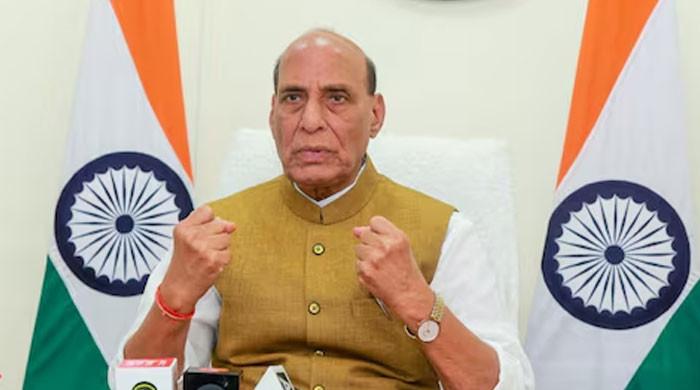Indian Minister Urges IMF to Reconsider Pakistan Loan Amidst Tensions
The Indian Defence Minister, Rajnath Singh, stated on Friday that the International Monetary Fund (IMF) should reassess its decision to provide a $1 billion loan to Pakistan, alleging that these funds could be used to finance terrorism. This suggestion has been strongly criticized by Islamabad, which views it as evidence of New Delhi’s desperation to undermine Pakistan’s stability.
Recent weeks have seen heightened tensions between India and Pakistan, marked by significant military clashes that resulted in approximately 70 casualties. A ceasefire was established on Saturday to de-escalate the situation. The conflict was reportedly triggered by an attack on tourists in Indian Illegally Occupied Jammu and Kashmir (IIOJK) last month, which New Delhi attributed to backing from Islamabad. Pakistan has refuted these accusations.
Singh, addressing troops at an air force base in western India, expressed his concerns: “I am of the opinion that a significant portion of the $1 billion from the IMF will be diverted towards funding terrorist infrastructure. Any economic assistance given to Pakistan is, in effect, support for terrorism.”
Despite India’s opposition, the IMF has proceeded with its loan program review for Pakistan, authorizing a $1 billion disbursement. The State Bank of Pakistan has confirmed receipt of these funds. Furthermore, the IMF has sanctioned an additional $1.4 billion loan for Pakistan under its climate resilience fund.
India, which also represents Bhutan, Sri Lanka, and Bangladesh on the IMF board, abstained from the vote. The Indian finance ministry issued a statement expressing “reservations regarding the effectiveness of IMF programs in Pakistan, citing its history of economic mismanagement.”
A spokesperson for Pakistan’s foreign ministry, Shafqat Ali Khan, responded to India’s actions by stating, “India was the only nation that attempted to block the loan, and it failed. This reflects India’s frustration. Criticizing an institution like the IMF highlights their level of desperation.”
Pakistan’s economy faced a severe crisis in 2023, exacerbated by political instability, pushing the country to the brink of default. A $7 billion bailout from the IMF, coupled with loans from allied nations, helped avert a complete economic collapse. Pakistan has also faced international scrutiny regarding its measures to combat illicit financing, leading to its placement on a money-laundering watchlist.
The Financial Action Task Force (FATF) removed Pakistan from its grey list in 2022, acknowledging the country’s notable progress in addressing these issues. On Friday, Britain’s Foreign Secretary, David Lammy, engaged in discussions with his Pakistani counterpart, Ishaq Dar, in Islamabad, focusing on the ceasefire agreement. Concurrently, the government conducted nationwide ceremonies to honor the military’s contributions.
Prime Minister Shehbaz Sharif, during a visit to troops on Thursday, affirmed, “Pakistan’s Armed Forces are fully prepared and strongly committed to defending every inch of our territory. Any act of aggression will be met with a resolute response.”
The Kashmir region remains a contentious issue between the two nations, having been the focal point of multiple conflicts.



Comments (0)
No comments yet. Be the first to comment!
Leave a Comment